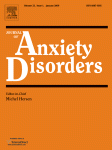Specificity of Intolerance of Uncertainty on Social Anxiety


Specificity of Intolerance of Uncertainty on Social Anxiety
A review of:
Boelen, P. A. & Reijntjes, A. (2009). Intolerance of uncertainty and social anxiety. Journal of Anxiety Disorders. 23, 130-135
By Kristen Perkins
In this article Boelen and Reijntjes (2009)seek to examine the link between intolerance of uncertainty (IU) with the severity of social anxiety symptoms. Previous research has indicated IU as highly significant in individuals suffering with GAD and OCD while less predictive of depression and other anxiety disorders including panic disorder. Since IU is operationally defined as finding uncertainty stressful, fearing that uncertainty reflects poorly on the individual, and blocks constructive action, it appeared reasonable that this type of intolerance of ambiguity may be reflected in social anxiety through the fear, avoidance and physical discomfort frequently observed in those suffering from this disorder.
The authors described two main goals of this study. The first was to examine the potential of IU to account for the variance within symptom severity of social anxiety while controlling for multiple previously established cognitive correlates. These correlates included fear of negative evaluation, anxiety sensitivity, low self-esteem, perfectionism, and pathological worry. The authors also indicated that they controlled for neuroticism so as to evaluate the other cognitive correlates independent of this feature. The second goal was to seek to further increase the understanding of the specificity of IU to social anxiety, OCD, GAD, and depression with an expectation that IU would indeed be related to symptoms for each of the anxiety disorders while not directly related to depression symptoms.
Participants (126 total, average age 47, 91% female) were provided with a consent form, informational letter and 11 self-report questionnaires measuring the constructs of intolerance of uncertainty, fear of negative evaluation, perfectionism, pathological worry, self-esteem, anxiety sensitivity, social phobia, depression, GAD, OCD, and neuroticism.
To address the first goal discussed by the authors of this article, results of the statistical analysis suggest that as expected, fear of negative evaluation, anxiety sensitivity, pathological worry and low self-esteem were significantly correlated with social anxiety. When neuroticism was controlled for, the results suggest that IU may well play an important role in social anxiety accounting for a significant portion of the variance above and beyond those of the most strongly correlated factors of fear of negative evaluation and anxiety sensitivity. To address the second goal, outcomes suggest that the author’s expectations about specificity were correct. Intolerance of uncertainty was identified to have greater specificity to OCD severity, followed by social anxiety, GAD, and depression respectively. These results offer support of earlier research finding IU to be correlated with OCD and GAD but not depression. An important contribution of this is study is the link observed between IU and social anxiety.
Several significant limitations must be acknowledged. Participants were originally recruited for participation in a grief study advertised in the newspaper. Respondents were provided an informational packet regarding the current study as well as the outcome of the grief study they originally responded to. Although participants in the current study had experienced the loss a minimum of 18 months earlier, and depression levels were non-clinical, it’s possible the selection process resulted in a population that may have been sensitized to uncertainty resulting from their recent loss and thus not reflective of the general population or anxiety and depression populations. Participation in the study was somewhat labor intensive given the number of questionnaires administered and the possibility of respondent fatigue must also be considered. Additionally, no conclusions about causality may be made given the cross-sectional design of the study. Despite these limitations, the study does suggest that further investigation of IU into severity of social anxiety as well the possible specificity to other psychological disorders is warranted.
To cite this review, please use this reference:
Perkins, K. (2009). Specificity of Intolerance to Uncertainty on Social Anxiety (3). http://psychologyalert.com/2009/02/specificity-of-intolerance-of.html

Well hiding from people and avoiding social situations is very common. One should work towards curbing this haste. Some natural anxiety remedies to look into are St.John's Wort, SAMe, L-Theanine, and Tryptophan. There's also cognitive behavioral therapy (CBT) and programs like Panic Away and The Linden Method, to name a few. Hope this helps!